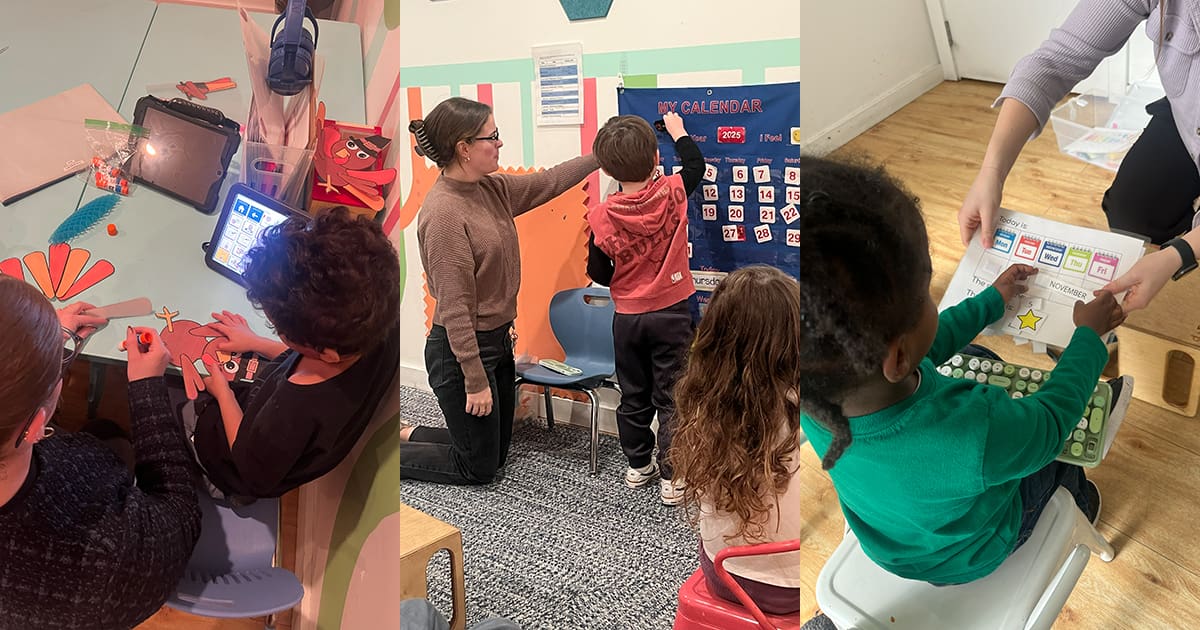Share this Post

For children developing speech and language skills, consistent practice and structured support are key to building confidence and communication abilities. Many children receive speech therapy sessions once or twice a week, but for those who need more frequent reinforcement and integrated learning, a therapeutic day program provides a highly effective approach.
At CST Academy, our therapeutic day programs combine speech therapy with structured learning and social interaction, creating a dynamic environment where children can practice and strengthen their communication skills throughout the day. This guide explores how therapeutic day programs enhance speech and language goals and why they are so beneficial for children who need extra support in communication development.
What is a Therapeutic Day Program?
A therapeutic day program is a structured, supportive learning environment that combines early education with therapy services such as speech therapy, occupational therapy, and behavioral support. Unlike traditional school settings, these programs are designed to help children develop essential skills at their own pace while receiving individualized, expert-led interventions.
A therapeutic day program provides:
- Daily exposure to speech and language-building activities
- One-on-one and small-group therapy sessions
- A multidisciplinary team of specialists, including speech-language pathologists (SLPs), occupational therapists, and behavioral therapists
- A structured, play-based learning environment that encourages communication development
- Consistent reinforcement of speech and language goals throughout the day
This comprehensive approach helps children build the skills they need for communication, social interaction, and school readiness.
How Therapeutic Day Programs Enhance Speech and Language Goals
1. Increased Opportunities for Speech Practice
For children working on speech clarity, vocabulary building, or social communication, occasional therapy sessions may not provide enough reinforcement. A therapeutic day program incorporates speech and language practice into everyday interactions, making skill development a natural and engaging part of the child’s routine.
Children benefit from:
- Daily exposure to speech-rich environments where they are encouraged to express themselves
- Guided peer interactions to practice conversation, turn-taking, and active listening
- Embedded speech therapy activities that reinforce articulation, language comprehension, and expressive language
The consistent repetition and reinforcement help children make faster progress toward their speech and language goals.
2. Individualized Support from Speech-Language Pathologists
A speech-language pathologist (SLP) plays a vital role in therapeutic day programs, tailoring interventions to meet each child’s unique communication needs. Unlike stand-alone speech therapy sessions, an SLP in a day program can observe the child in various settings and adjust their approach accordingly.
SLPs in a therapeutic day program:
- Conduct ongoing assessments to monitor progress and adjust goals as needed
- Provide direct speech therapy sessions while collaborating with teachers and other therapists
- Integrate speech goals into classroom activities, playtime, and structured lessons
- Support children in using communication tools, such as visual schedules or assistive technology
By working closely with educators and therapists, SLPs ensure that speech therapy is seamlessly woven into the child’s daily routine.
3. Social Communication and Peer Interaction
For many children, social communication is one of the most challenging aspects of language development. Engaging with peers in a structured, supportive setting allows children to practice their communication skills in real-life situations.
Therapeutic day programs help children develop:
- Conversational skills, such as initiating and maintaining interactions
- Nonverbal communication, including body language, eye contact, and facial expressions
- Conflict resolution and emotional expression in social settings
- Confidence in group participation, such as following multi-step directions and asking for help
These peer-based interactions help children apply their speech and language skills in meaningful ways, reinforcing what they learn in therapy sessions.
4. Structured Routines That Reinforce Language Goals
A predictable daily routine helps children with language delays feel comfortable and confident in their environment. Therapeutic day programs provide structured activities that encourage children to listen, follow directions, and use language purposefully throughout the day.
These routines include:
- Morning circle time, where children practice greetings, answering questions, and participating in group discussions
- Storytelling and literacy activities to build vocabulary, comprehension, and expressive language skills
- Movement-based learning, incorporating songs, rhymes, and interactive games that promote speech development
- Snack and meal times, where children are encouraged to use words to make requests and express preferences
By making speech and language practice part of daily activities, children gain confidence in their ability to communicate in various situations.
5. Sensory and Motor Integration to Support Speech Development
Many children who need speech therapy also have challenges with sensory processing or fine motor coordination, which can impact their ability to articulate words, regulate their speech flow, and engage in communication activities.
Therapeutic day programs integrate speech therapy with occupational therapy to provide:
- Oral-motor exercises to strengthen the muscles used for speech production
- Sensory-friendly strategies to help children feel comfortable and focused during speech activities
- Movement-based therapy to encourage coordination between breathing, posture, and vocalization
This holistic approach ensures that children develop both the physical and cognitive skills needed for effective speech and language development.
6. Parent Involvement and At-Home Reinforcement
Family involvement is a key component of speech therapy success. In a therapeutic day program, parents receive regular updates on their child’s progress, guidance on speech strategies, and tools for reinforcing skills at home.
- Therapists provide coaching sessions to help parents support communication development outside of school
- Home-based activities are shared to strengthen speech and language goals through play and daily interactions
- Progress monitoring allows parents to see how their child is improving and where additional support may be needed
By creating a strong partnership between therapists, teachers, and families, therapeutic day programs ensure that speech and language progress continues beyond the classroom.
Is a Therapeutic Day Program Right for Your Child?
A therapeutic day program with integrated speech therapy may be the right fit if your child:
- Has difficulty expressing thoughts, following directions, or using age-appropriate vocabulary
- Struggles with social communication, such as making eye contact or engaging in conversations
- Needs extra support in articulation, stuttering, or sentence formation
- Would benefit from a structured learning environment that reinforces speech goals throughout the day
- Has additional developmental needs, such as sensory processing challenges or motor delays
By providing consistent, structured, and engaging speech therapy support, therapeutic day programs help children develop communication skills that prepare them for long-term success.
How CST Academy Supports Speech and Language Development
At CST Academy, our therapeutic day programs are designed to enhance speech and language development through structured learning, play-based therapy, and individualized support. Our program offers:
- Highly trained speech-language pathologists who create personalized therapy plans
- A multidisciplinary approach, including occupational therapy and behavioral support
- Small class sizes to provide individualized attention and reinforcement
- A structured, language-rich environment that encourages daily communication practice
If you are looking for a comprehensive program that supports speech and language development in a nurturing, play-based setting, contact CST Academy today to learn more about how we can help your child build confidence in communication.
Discover Our Pediatric Therapy & Autism Care
ABA Therapy
Support for children with autism.
Autism Evaluation
Expert assessments to identify child needs.
Pediatric Therapy Services
Speech, Occupational, Feeding, and Physical Therapy.
Therapeutic Preschool
A classroom environment designed for early learners with unique needs.

Find the Best Care for Your Child




